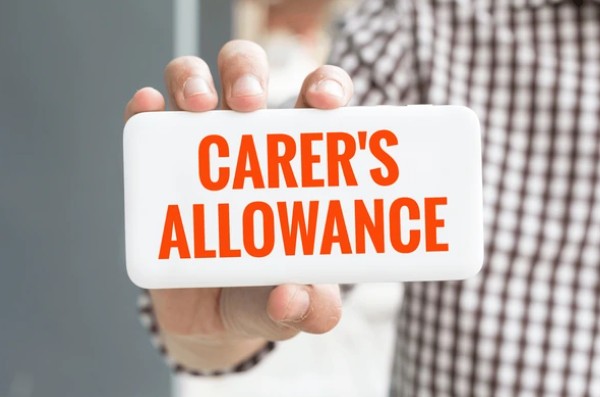Carers Allowance is a UK benefit for people who spend 35+ hours a week caring for someone with a disability and earn below the income limit set by DWP.
It’s aimed at unpaid carers providing regular support to someone receiving certain disability benefits, like PIP or Attendance Allowance.
Though the amount is modest, it offers financial help and may give access to extra support such as Universal Credit or Pension Credit. You don’t have to be related to the person you care for, but you must meet eligibility rules. It’s a small but important support for those doing vital care work.
Benefits of Carers Allowance
Carer’s Allowance is financial help for those providing full-time care. It was designed to support your income, offer NI credits, and boost other benefits. You may also get help with Council Tax or qualify for Income Support.
It recognises unpaid carers and ensures you’re not left without support while caring for someone on disability benefits.
How Much Carers Allowance can I get in 2025?
In 2025, Carer’s Allowance is £81.90 weekly if you care for someone 35+ hours, they get disability benefits, and you meet income and eligibility rules in the UK.

5 important facts about how Carer’s Allowance works:
- Paid Weekly or Every 4 Weeks – The standard rate of £81.90 can be paid weekly in advance or every four weeks. You can choose the payment schedule that fits your financial routine best.
- It’s Considered Taxable Income – Carer’s Allowance is treated as taxable income. This means it could impact the amount you receive from other benefits like Universal Credit, Housing Benefit, or Pension Credit.
- Earnings Limit Applies Each Week – To qualify, your net earnings must not go over £151 per week after tax, National Insurance, and allowable expenses. Going over the limit—even once—can affect your claim.
- No Extra If You Care for More Than One Person – Even if you care for multiple people who each qualify, you’ll still only receive one Carer’s Allowance payment. There’s no additional amount for extra caring responsibilities.
- It Can Unlock Other Support – Receiving Carer’s Allowance may entitle you to extra help, such as Carer’s Credit (to help protect your State Pension), help with council tax, or increased amounts in means-tested benefits.
Who is eligible for Carers Allowance?
To get Carer’s Allowance, you must care 35+ hours weekly, earn £151 or less after tax, and the person must get a benefit like PIP, DLA, or Attendance Allowance.
Age and Residency Requirements
To qualify for Carer’s Allowance, you must be at least 16 years old and live in England, Scotland, or Wales.
You must also have been physically present in the UK for at least 2 of the last 3 years, and not be subject to immigration control unless you meet the exemption criteria. These rules ensure that only long-term UK residents are eligible for government support.
Minimum Caring Hours Per Week
You must provide a minimum of 35 hours of unpaid care per week to someone with a disability or long-term health condition.
This care can include tasks such as helping with washing, dressing, cooking, taking medication, attending appointments, or offering emotional support. The 35 hours can be spread throughout the week and do not need to be continuous.
Income Limits and Other Benefits
To be eligible, your weekly earnings must not exceed £151 after tax, National Insurance, and allowable expenses such as travel or pension contributions.
If you receive other benefits like Universal Credit or State Pension, Carer’s Allowance may reduce those payments or affect eligibility, so it’s a good idea to get a benefits check or speak with a welfare adviser.
Eligible Conditions for the Person You Care For
The person you care for must be receiving a qualifying disability benefit, such as:
- Personal Independence Payment (PIP) – daily living or mobility component
- Disability Living Allowance (DLA) – middle or higher care rate
- Attendance Allowance (AA) – for those over State Pension age

These benefits confirm the person needs substantial help with everyday activities or mobility, making you eligible to claim support for your time and effort.
Can I Claim Carers Allowance for Myself?
No, you can’t claim Carer’s Allowance for yourself. It’s a UK benefit for those who provide at least 35 hours of unpaid care to someone who needs support.
If you and someone else care for each other, only one of you can claim Carer’s Allowance. The system doesn’t allow both carers to receive it for mutual care.
Even if you don’t get paid Carer’s Allowance due to other benefits—like the State Pension—you might still have what’s called an underlying entitlement. This doesn’t give you extra money directly, but it can help boost income-based benefits like Pension Credit or Housing Benefit.
Carer’s Allowance also isn’t a means-tested benefit, but receiving it can affect how much you get from other support, especially if you live with a partner or claim Universal Credit.
It’s always a good idea to report any caring responsibilities, even if you’re not eligible for payments. It could still affect your overall benefit entitlement in a positive way.
How to Apply for Carers Allowance?
Carer’s Allowance is paid if you care 35+ hours weekly. You can apply online at GOV.UK if the person you care for was on a qualifying disability benefit.
Apply Online
The easiest way to apply is through the official government website: www.gov.uk/carers-allowance
You’ll need the following information:
- Your National Insurance number
- Details about the person you care for (including their date of birth and National Insurance number)
- Your income details and any recent employment information
- Your bank or building society account details
Once submitted, most applicants receive a decision within 6 to 8 weeks.
Frequently Asked Questions
Can I work and still get Carers Allowance?
Yes, if your net earnings are £151 or less per week after deductions.
Does Carers’ Allowance affect other benefits?
Yes, it may reduce income-based benefits, but you could get extra benefits like the Carer Premium.
Can I receive Carer’s Allowance and a State Pension?
Not fully. You can’t be paid both, but you may have an underlying entitlement that helps with other benefits.
What if I stop being a carer?
You must inform DWP immediately if your caring role ends.
Are there other benefits for carers?
Yes. You may be eligible for Council Tax Reduction, free prescriptions, and other local carer support.






